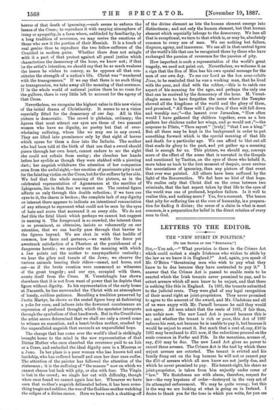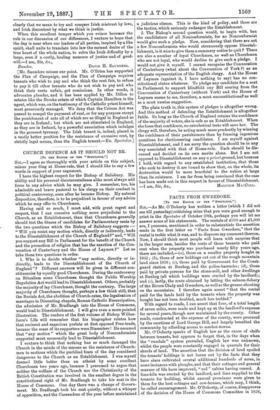LETTERS TO THE EDITOR.
THE "NEW SPIRIT IN POLITICS."
[TO TEE EDITOR Or Tea BracriToTel Sta,—Yon ask,—" What provision is there in the Crimes Act which could molest a single Irishman who wishes to abide by the law as we know it in England ?" And, again, you speak of Mr. O'Brien "threatening men who wish to pay what they know to be due because they have contracted to pay it." I answer that the Crimes Act is passed to enable rents to be exacted which the Irish tenants never promised to pay, and to extort arrears which all men know to be unjuet, and that there is nothing like this in England. In 1881, the tenants submitted to the judicial rents. They were glad of any legal recognition of their moral right as joint-proprietors. They never promised to agree to the amount of the award, and Mr. Gladstone and all of us were angry with Mr. Parnell because he said they would not agree. All men admit that the rents of 1881, if fair then, are unfair now. The new Land Act is passed because this is so ; and whether the tenant is rich or poor, this Act of 1887 reduces his rent, not because he is unable to pay it, but because it would be unjust to exact it. But mark that a rent of, say, £40 in 1881 may be reduced to £25 now, if the reductions proceed on the scale common in Forfar and Fife. In the meantime, arrears of, say, £50 may be due. The new Land Act gives no power to cancel these arrears. The Crimes Act is the tool by which these unjust arrears are extorted. The tenant is evicted and his family flung out on the bog because he will not or cannot pay the £50 of arrears which all men know are not justly due, and which he never promised to pay. His tenant-right, his share as joint-proprietor, is taken from him unjustly under cover of "law." We Scotchmen see with alarm, therefore, respect for law—the very keystone of order—destroyed in the very act of its attempted enforcement. We may be quite wrong ; but this is the way we are looking at what is going on in Ireland. I desire to thank you for the tone in whioh you write, for you see -clearly that we mean to try and conquer Irish mistrust by love, and Irish discontent by what we think is justice.
When this excellent temper which you evince becomes the Tale in our discussion of our differences, I venture to hope that the day is near when our leaders of all parties, inspired by a like spirit, shall unite to translate into law the earnest desire of the true heart of the whole nation, to solve the Irish difficulty by a large, even if a costly, healing measure of justice and of good- will.—I am, Sir, Ac.,
[Mr. Saunders misses our point. Mr. O'Brien has supported the Plan of Campaign, and the Plan of Campaign requires tenants who wish to pay and who think the rent fair, to refuse to pay it till other tenants who do not wish to pay and who think their rents unfair, get remissions. In other words, it advocates plunder, and it has been applied by Mr. Dillon to estates like the Brooke estate of which Captain Hamilton is the agent, which was, on the testimony of the Catholic priest himself, most generously managed. We deny that the Crimes Act was passed to compel the payment of rent, or for any purpose except the punishment of acts all of which are as illegal in England as they are in Ireland ; but which are not stimulated in England, as they are in Ireland, by a powerful association which indulges in the grossest tyranny. The Irish tenant is, indeed, placed in a vastly better position for the resistance of excessive rent, by strictly legal means, than the English tenant.—En. Spectator.]
























































 Previous page
Previous page